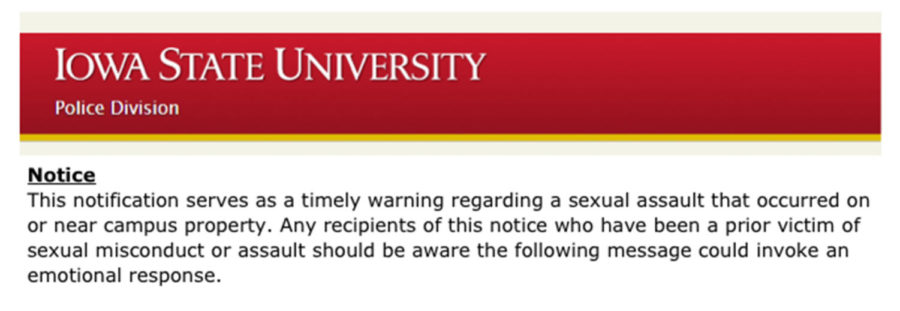Iowa State violates Clery Act
September 4, 2014
Iowa State was found out of compliance because of the way students and employees were informed about sexual assaults or other crimes, according to an internal audit.
The June 17 report showed that Iowa State wasn’t following the new interpretations of the Clery Act.
Under the Clery Act, colleges and universities that are part of the federal aid program are to share information about crimes that happen on or around campus that may pose a continuing threat to students and employees.
With Iowa State’s process, some crimes would be reported and posted to the ISU Police Department’s page but not sent out in a mass message.
“The auditors felt like that was inappropriate and that we should push out the information to students and employees any time we have that kind of information,” said Keith Bystrom, ISU associate counsel.
The current interpretation of the Clery Act says the university should communicate with individuals so they don’t have to take the extra step to go to the website, said Warren Madden, senior vice president for business and finance.
“This has not been about whether we are providing notice,” Madden said. “It’s a question about how we do it and in essence how do we communicate with the 40,000 individuals that are on the emergency notification lists.”
The Clery Act requires that universities must issue timely warnings that spread information quickly by email, voicemail or text message, according to the Handbook of Campus Safety and Security from the Department of Education.
“Timely warnings may not be issued in a manner or posted in a location that requires the campus community to make requests for them or to search for them. The responsibility for getting the warning out rests solely with the institution,” according to the handbook.
Timely warnings are issued to inform students and employees of potential risks so they can take the necessary actions to stay safe.
Jerry Stewart, director of the Department of Public Safety, was not available to comment Sept. 4 but said via email response, “We, along with a number of other schools, have elected to change the way in which we inform our respective communities about acquaintance sexual assaults.”
Madden said each crime is evaluated on a case-by-case basis. There are a few people allowed to issue a timely warning, he said, including the Department of Public Safety and University Relations.
“I don’t know that we’re in agreement that we have not been in compliance historically,” Madden said. “We clearly want to be in compliance with the Clery Act.”
The internal auditors made recommendations to the university, and Iowa State will discuss the audit at the Sept. 9 and 10 Board of Regents meeting.
Madden predicts the recommendations will mean more notifications to the campus community and increased discussion about how the information is communicated.







